Unit 9 I like music that I can dance to. SectionB(2a-2e)课件(共23张PPT)
文档属性
| 名称 | Unit 9 I like music that I can dance to. SectionB(2a-2e)课件(共23张PPT) | 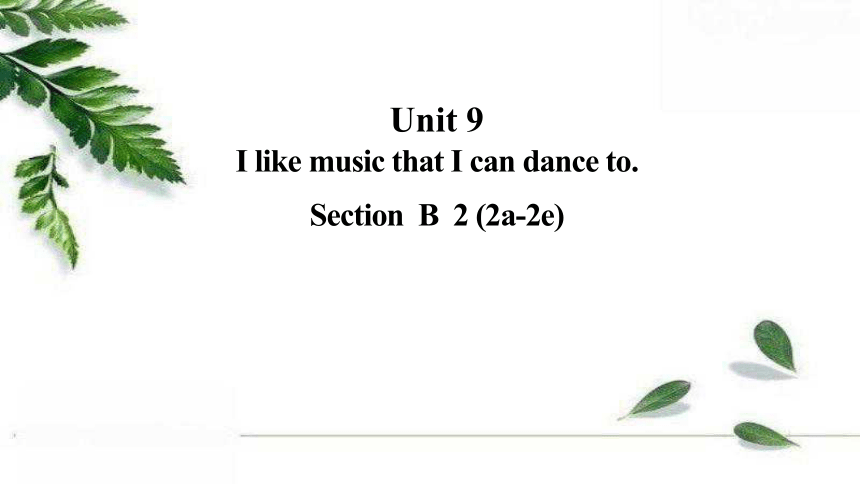 | |
| 格式 | zip | ||
| 文件大小 | 9.7MB | ||
| 资源类型 | 教案 | ||
| 版本资源 | 人教新目标(Go for it)版 | ||
| 科目 | 英语 | ||
| 更新时间 | 2021-09-09 10:37:26 | ||
图片预览

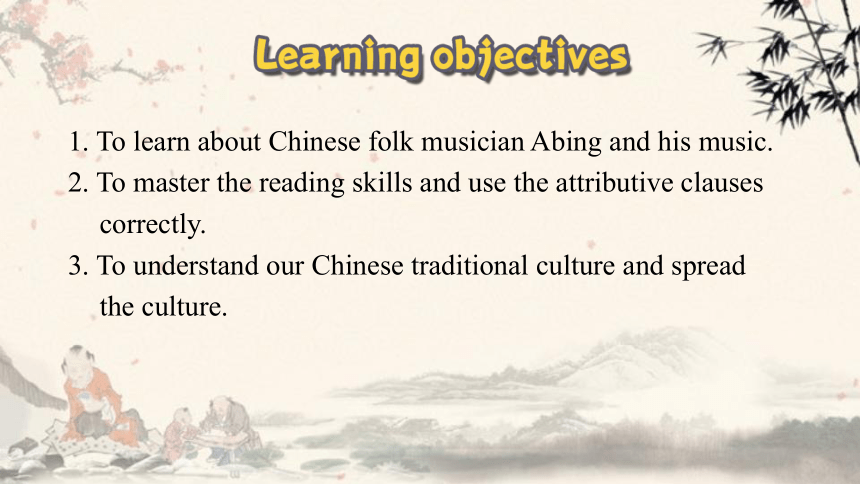
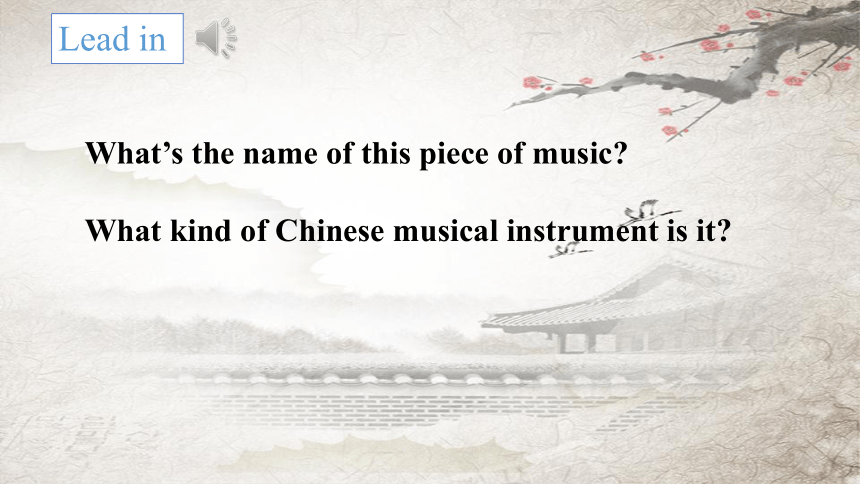
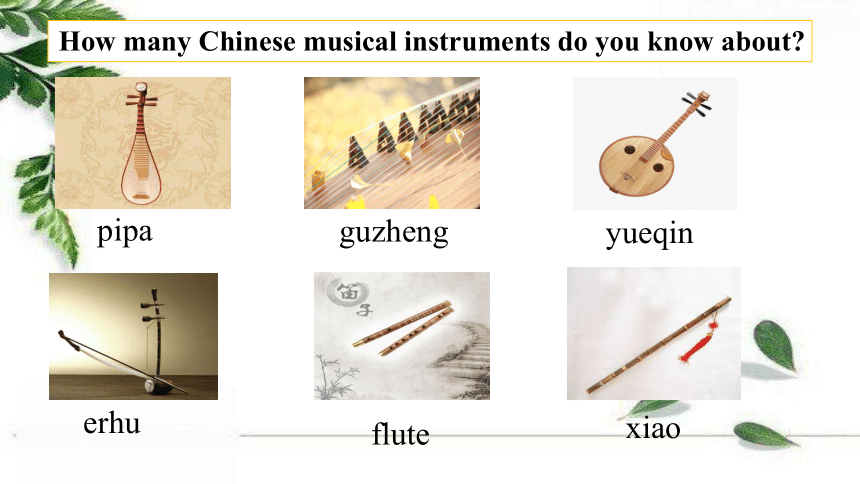
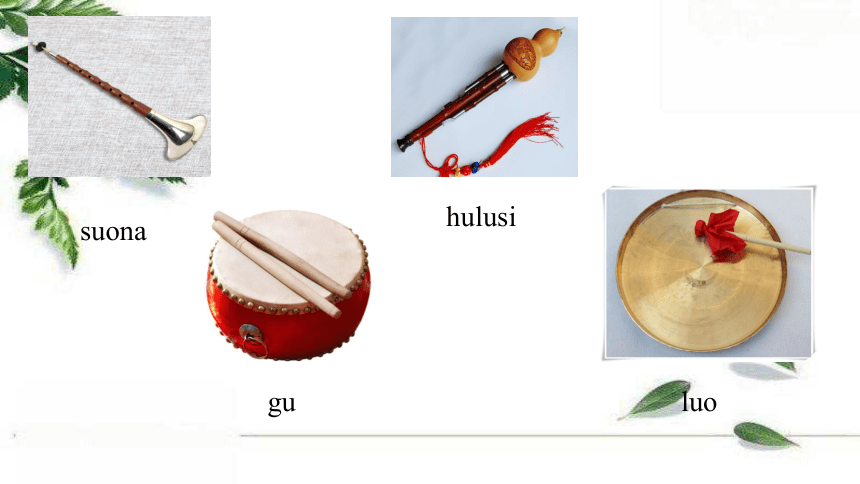
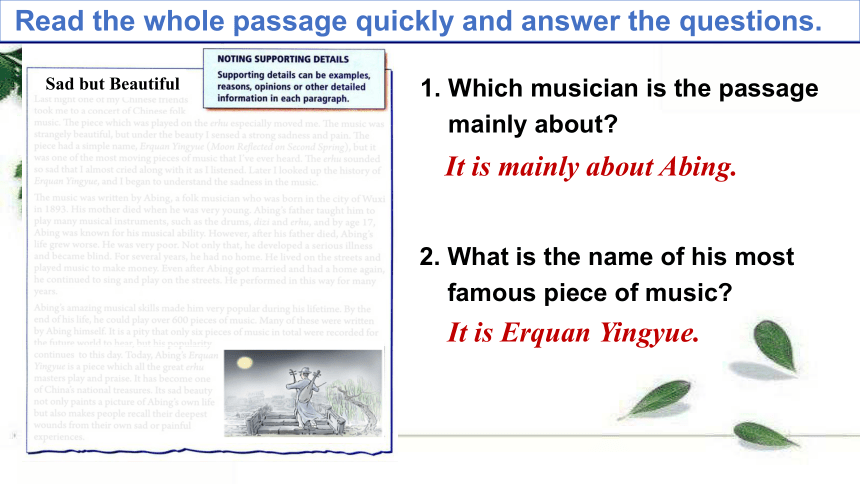
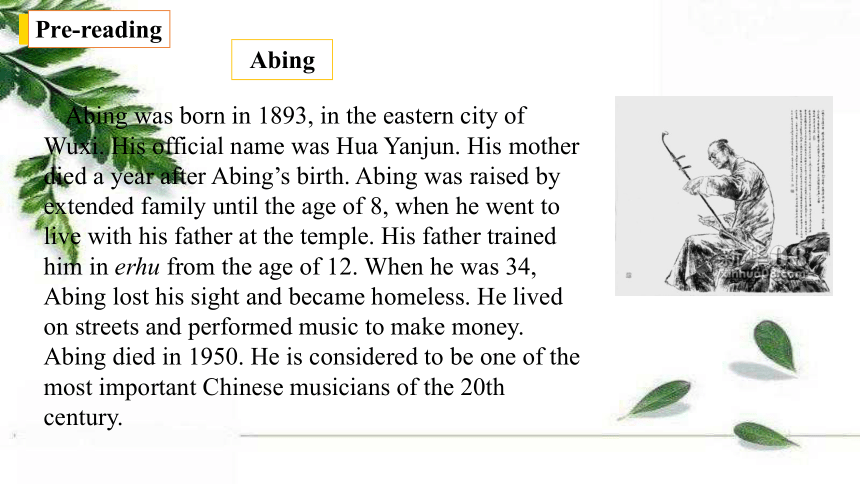
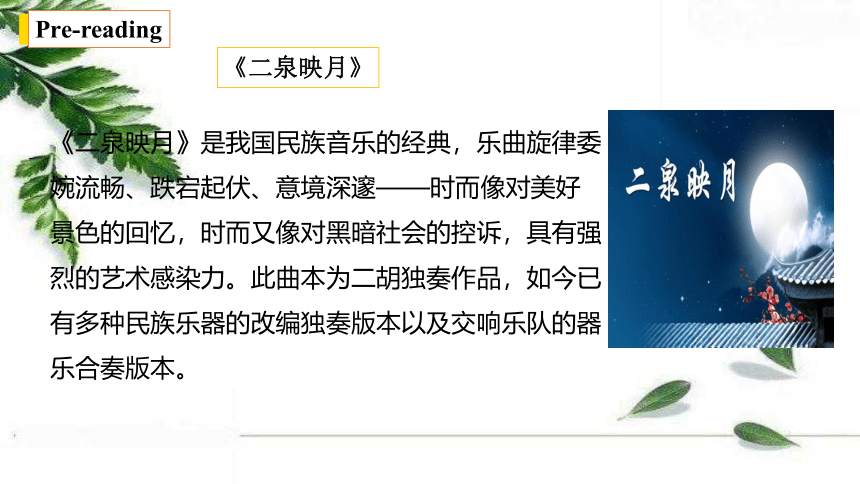
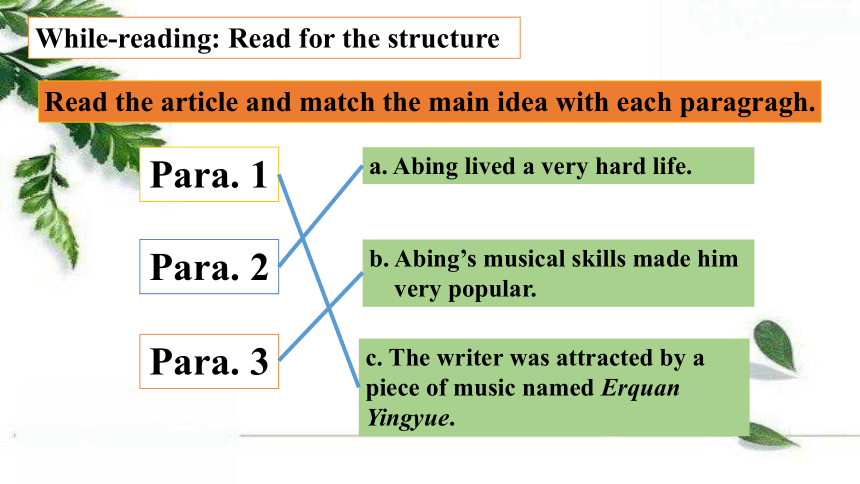
文档简介
(共23张PPT)
Unit
9
I
like
music
that
I
can
dance
to.
Section
B
2
(2a-2e)
1.
To
learn
about
Chinese
folk
musician
Abing
and
his
music.
2.
To
master
the
reading
skills
and
use
the
attributive
clauses
correctly.
3.
To
understand
our
Chinese
traditional
culture
and
spread
the
culture.
What’s
the
name
of
this
piece
of
music?
What
kind
of
Chinese
musical
instrument
is
it?
Lead
in
How
many
Chinese
musical
instruments
do
you
know
about?
pipa
erhu
flute
guzheng?
yueqin?
xiao?
suona
gu
hulusi
luo
Look
at
the
title
and
the
picture
to
get
some
information.
Read
the
whole
passage
quickly
and
answer
the
questions.
1.
Which
musician
is
the
passage
mainly
about?
2.
What
is
the
name
of
his
most
famous
piece
of
music?
It
is
mainly
about
Abing.
It
is
Erquan
Yingyue.
Sad
but
Beautiful
Abing
Pre-reading
Abing
was
born
in
1893,
in
the
eastern
city
of
Wuxi.
His
official
name
was
Hua
Yanjun.
His
mother
died
a
year
after
Abing’s
birth.
Abing
was
raised
by
extended
family
until
the
age
of
8,
when
he
went
to
live
with
his
father
at
the
temple.
His
father
trained
him
in
erhu
from
the
age
of
12.
When
he
was
34,
Abing
lost
his
sight
and
became
homeless.
He
lived
on
streets
and
performed
music
to
make
money.
Abing
died
in
1950.
He
is
considered
to
be
one
of
the
most
important
Chinese
musicians
of
the
20th
century.
Pre-reading
《二泉映月》
《二泉映月》是我国民族音乐的经典,乐曲旋律委婉流畅、跌宕起伏、意境深邃——时而像对美好景色的回忆,时而又像对黑暗社会的控诉,具有强烈的艺术感染力。此曲本为二胡独奏作品,如今已有多种民族乐器的改编独奏版本以及交响乐队的器乐合奏版本。
Para.
1
Para.
2
Para.
3
c.
The
writer
was
attracted
by
a
piece
of
music
named
Erquan
Yingyue.
a.
Abing
lived
a
very
hard
life.
b.
Abing’s
musical
skills
made
him
very
popular.
Read
the
article
and
match
the
main
idea
with
each
paragragh.
While-reading:
Read
for
the
structure
Read
Para.
1
and
answer
the
questions.
Main
idea:
_____________________________________
I
was
moved
by
a
piece
of
music
named
Erquan
Yingyue.
Why
did
Erquan
Yingyue
move
the
writer?
Last
night
one
of
my
Chinese
friends
took
me
to
a
concert
of
Chinese
folk
music.
The
piece
which
was
played
on
the
erhu
especially
moved
me.
The
music
was
strangely
beautiful,
but
under
the
beauty
I
sensed
a
strong
sadness
and
pain.
The
piece
had
a
simple
name,
Erquan
Yingyue
(Moon
Reflected
on
Second
Spring),
but
it
was
one
of
the
most
moving
pieces
of
music
that
I’ve
ever
heard.
The
erhu
sounded
so
sad
that
I
almost
cried
along
with
it
as
I
listened.
Later
I
looked
up
the
history
of
Erquan
Yingyue,
and
I
began
to
understand
the
sadness
in
the
music.
strangely
beautiful
sense
sadness,
pain
the
most
moving
almost
cried
along
...
Why
In
1893,
Abing
was
born.
When
he
was
very
______,
his
mother
____.
At
the
age
of
17,
Abing
was
known
for
his
musical
ability.
For
several
years,
he
had
__________,
and
lived
_____________.
After
_________
died,
Abing
became
_________
and
______.
died
very
poor
no
home
on
the
streets
He
continued
to
________
on
the
streets.
perform
blind
young
his
father
Read
Para.
2
and
fill
in
the
blanks.
Main
idea:
_____________________________________
Abing
lived
a
very
hard
life.
Read
Para
3.
and
answer
the
questions.
Main
idea:
_____________________________________
Abing’s
musical
skills
made
him
very
popular.
Why
is
Abing
so
popular?
He
could
play
over
_____
pieces
of
music.
600
All
the
great
erhu
________
still
play
and
______
his
Erquan
Yingyue
today.
masters
praise
It
has
become
one
of
China’s
national
_________.
treasures
Summary
strangely
beautiful,
sadness
and
pain
one
of
the
most
moving
...
so
sad
that
...
almost
cried
…
mother
died
when
…
very
young
father
died
…
poor
and
blind
lived
on
the
streets
and
played
…
to
…
could
play
over
600
…
many
…
himself
…
play
and
praise
…
China’s
national
treasures
moved
by
Erquan
Yingyue
Abing’s
hard
life
Sad
but
Beautiful
Abing’s
popularity
Abing
played
music
(that/who)
could
touch
the
hearts
of
people.
When
we
listen
to
his
music,
we
can
______
both
the
beauty
and
the
sadness
in
it.
It
makes
us
think
about
the
_______
and
_______
(that/who)
we
have
experienced
in
the
past.
For
this
reason,
many
people
_______
him
as
the
musician
who
has
greatly
influenced
erhu
music.
So
it
is
really
a
______
that
not
many
pieces
of
his
music
were
recorded.
sense
pain
wounds
praise
pity
pain
wounds
sense
pity
praise
2d.
Circle
that
or
who
and
fill
in
the
blanks
with
the
words
in
the
box.
No
matter
how
many
difficulties
we
have,
face
our
life
and
try
our
best
to
solve
them.
Be
confident!
Post-reading
Student
A
is
a
foreign
visitor
who
is
interested
in
Abing
and
his
music.
Student
B
is
a
Chinese
student
who
knows
about
Abing.
Use
the
information
in
the
passage
to
make
a
conversation.
A:
What
kind
of
musical
instruments
did
Abing
play?
B:
He
could
play
many
instruments,
but
he
is
best
known
for
playing
the
erhu.
Language
points
1.
The
music
was
strangely
beautiful,
but
under
the
beauty
I
sensed
a
strong
sadness
and
pain.
(1)
sense在此处作及物动词,意为“感觉到;意识到”
。
(2)
sense还可作可数名词,意为“感觉;意识”。
a
sense
of
……的感觉
make
sense
of
弄懂……的意思
sense
v.
感觉到;意识到
n.
感觉;意识
We
can
sense
his
sadness.
We
all
believe
in
him
because
he
has
a
strong
sense
of
dudy.
2.
The
piece
had
a
simple
name,
Erquan
Yingyue
(Moon
Reflected
on
Second
Spring),
but
it
was
one
of
the
most
moving
pieces
of
music
that
I’ve
ever
heard.
reflect
v.
反映,映出。作动词,常用于被动语态。
其名词形式为reflection,意为“映像;反映”。
reflect
on/upon
反思,回想
Her
face
was
reflected
in
the
mirror.
Can
you
see
your
reflection
in
the
glass?
Your
clothes
are
often
a
reflection
of
your
personality.
She
was
left
to
reflect
on
the
result
of
her
wrong
decision.
3.
He
performed
in
this
way
for
many
years.
(1)
perform在此处作动词,意为“表演”。
Do
you
know
when
this
play
was
first
performed?
(2)
perform
作动词时还可意为“执行”,与carry
out意思相近。
One
should
always
perform
what
he
promises.
(3)
vi
表现;运转:
The
machine
is
performing
very
poorly.
perform
v.
表演
→
performance
n.
表演
→
performer
n.
表演者
4.
It
is
a
pity
that
only
six
pieces
of
music
in
total
were
recorded
for
the
future
world
to
hear.
(1)
pity在此处作名词,意为“遗憾”,相当于shame。
What
a
pity!
It
would
be
a
pity
to
give
up
now
—
you’ve
nearly
finished.
(2)
pity
n.
还可意为“怜悯”
The
old
lady
often
takes
pity
on
small
animals.
(3)
pity
v.
意为“同情;怜悯”。
Pity
those
on
the
street
who
are
homeless.
pity
n.
遗憾;怜悯
v.
同情;怜悯
5.
Today,
Abing’s
Erquan
Yingyue
is
a
piece
which
all
the
great
erhu
masters
play
and
praise.
master
n.
大师;能手;主人
v.
掌握
(1)
master在此处作可数名词,意为“大师;能手”。此外,master作名词,还有“主人”的意思。
Mei
Lanfang
is
a
master
of
Bejing
Opera.
The
cat
stayed
beside
its
master
until
the
end
of
his
life.
(2)
master还可作及物动词,意为“掌握”。
It’s
hard
to
master
a
foreign
language.
praise
v.
&
n.
表扬;赞扬
(1)
praise在此句中作动词,
praise
sb.
/sth.
for
(doing)
sth.
因(做)某事而赞扬某人/某物。
The
policeman
praised
the
young
man
for
saving
the
little
girl.
Everyone
praises
Hangzhou
for
its
scenery.
(2)
praise
还可作名词,意为“赞扬;赞美”
。
常用短语:in
(high)
praise
of
“(高度)赞美……”;
win/receive
praise
(from
...)“赢得/获得
(……的)称赞”。
She
wrote
poems
in
praise
of
freedom.
Homework
1.
Search
for
the
Internet
and
learn
more
about
Chinese
folk
musicians
and
music.
2.
Talk
about
the
folk
music
and
traditional
instrument
you
know.
Unit
9
I
like
music
that
I
can
dance
to.
Section
B
2
(2a-2e)
1.
To
learn
about
Chinese
folk
musician
Abing
and
his
music.
2.
To
master
the
reading
skills
and
use
the
attributive
clauses
correctly.
3.
To
understand
our
Chinese
traditional
culture
and
spread
the
culture.
What’s
the
name
of
this
piece
of
music?
What
kind
of
Chinese
musical
instrument
is
it?
Lead
in
How
many
Chinese
musical
instruments
do
you
know
about?
pipa
erhu
flute
guzheng?
yueqin?
xiao?
suona
gu
hulusi
luo
Look
at
the
title
and
the
picture
to
get
some
information.
Read
the
whole
passage
quickly
and
answer
the
questions.
1.
Which
musician
is
the
passage
mainly
about?
2.
What
is
the
name
of
his
most
famous
piece
of
music?
It
is
mainly
about
Abing.
It
is
Erquan
Yingyue.
Sad
but
Beautiful
Abing
Pre-reading
Abing
was
born
in
1893,
in
the
eastern
city
of
Wuxi.
His
official
name
was
Hua
Yanjun.
His
mother
died
a
year
after
Abing’s
birth.
Abing
was
raised
by
extended
family
until
the
age
of
8,
when
he
went
to
live
with
his
father
at
the
temple.
His
father
trained
him
in
erhu
from
the
age
of
12.
When
he
was
34,
Abing
lost
his
sight
and
became
homeless.
He
lived
on
streets
and
performed
music
to
make
money.
Abing
died
in
1950.
He
is
considered
to
be
one
of
the
most
important
Chinese
musicians
of
the
20th
century.
Pre-reading
《二泉映月》
《二泉映月》是我国民族音乐的经典,乐曲旋律委婉流畅、跌宕起伏、意境深邃——时而像对美好景色的回忆,时而又像对黑暗社会的控诉,具有强烈的艺术感染力。此曲本为二胡独奏作品,如今已有多种民族乐器的改编独奏版本以及交响乐队的器乐合奏版本。
Para.
1
Para.
2
Para.
3
c.
The
writer
was
attracted
by
a
piece
of
music
named
Erquan
Yingyue.
a.
Abing
lived
a
very
hard
life.
b.
Abing’s
musical
skills
made
him
very
popular.
Read
the
article
and
match
the
main
idea
with
each
paragragh.
While-reading:
Read
for
the
structure
Read
Para.
1
and
answer
the
questions.
Main
idea:
_____________________________________
I
was
moved
by
a
piece
of
music
named
Erquan
Yingyue.
Why
did
Erquan
Yingyue
move
the
writer?
Last
night
one
of
my
Chinese
friends
took
me
to
a
concert
of
Chinese
folk
music.
The
piece
which
was
played
on
the
erhu
especially
moved
me.
The
music
was
strangely
beautiful,
but
under
the
beauty
I
sensed
a
strong
sadness
and
pain.
The
piece
had
a
simple
name,
Erquan
Yingyue
(Moon
Reflected
on
Second
Spring),
but
it
was
one
of
the
most
moving
pieces
of
music
that
I’ve
ever
heard.
The
erhu
sounded
so
sad
that
I
almost
cried
along
with
it
as
I
listened.
Later
I
looked
up
the
history
of
Erquan
Yingyue,
and
I
began
to
understand
the
sadness
in
the
music.
strangely
beautiful
sense
sadness,
pain
the
most
moving
almost
cried
along
...
Why
In
1893,
Abing
was
born.
When
he
was
very
______,
his
mother
____.
At
the
age
of
17,
Abing
was
known
for
his
musical
ability.
For
several
years,
he
had
__________,
and
lived
_____________.
After
_________
died,
Abing
became
_________
and
______.
died
very
poor
no
home
on
the
streets
He
continued
to
________
on
the
streets.
perform
blind
young
his
father
Read
Para.
2
and
fill
in
the
blanks.
Main
idea:
_____________________________________
Abing
lived
a
very
hard
life.
Read
Para
3.
and
answer
the
questions.
Main
idea:
_____________________________________
Abing’s
musical
skills
made
him
very
popular.
Why
is
Abing
so
popular?
He
could
play
over
_____
pieces
of
music.
600
All
the
great
erhu
________
still
play
and
______
his
Erquan
Yingyue
today.
masters
praise
It
has
become
one
of
China’s
national
_________.
treasures
Summary
strangely
beautiful,
sadness
and
pain
one
of
the
most
moving
...
so
sad
that
...
almost
cried
…
mother
died
when
…
very
young
father
died
…
poor
and
blind
lived
on
the
streets
and
played
…
to
…
could
play
over
600
…
many
…
himself
…
play
and
praise
…
China’s
national
treasures
moved
by
Erquan
Yingyue
Abing’s
hard
life
Sad
but
Beautiful
Abing’s
popularity
Abing
played
music
(that/who)
could
touch
the
hearts
of
people.
When
we
listen
to
his
music,
we
can
______
both
the
beauty
and
the
sadness
in
it.
It
makes
us
think
about
the
_______
and
_______
(that/who)
we
have
experienced
in
the
past.
For
this
reason,
many
people
_______
him
as
the
musician
who
has
greatly
influenced
erhu
music.
So
it
is
really
a
______
that
not
many
pieces
of
his
music
were
recorded.
sense
pain
wounds
praise
pity
pain
wounds
sense
pity
praise
2d.
Circle
that
or
who
and
fill
in
the
blanks
with
the
words
in
the
box.
No
matter
how
many
difficulties
we
have,
face
our
life
and
try
our
best
to
solve
them.
Be
confident!
Post-reading
Student
A
is
a
foreign
visitor
who
is
interested
in
Abing
and
his
music.
Student
B
is
a
Chinese
student
who
knows
about
Abing.
Use
the
information
in
the
passage
to
make
a
conversation.
A:
What
kind
of
musical
instruments
did
Abing
play?
B:
He
could
play
many
instruments,
but
he
is
best
known
for
playing
the
erhu.
Language
points
1.
The
music
was
strangely
beautiful,
but
under
the
beauty
I
sensed
a
strong
sadness
and
pain.
(1)
sense在此处作及物动词,意为“感觉到;意识到”
。
(2)
sense还可作可数名词,意为“感觉;意识”。
a
sense
of
……的感觉
make
sense
of
弄懂……的意思
sense
v.
感觉到;意识到
n.
感觉;意识
We
can
sense
his
sadness.
We
all
believe
in
him
because
he
has
a
strong
sense
of
dudy.
2.
The
piece
had
a
simple
name,
Erquan
Yingyue
(Moon
Reflected
on
Second
Spring),
but
it
was
one
of
the
most
moving
pieces
of
music
that
I’ve
ever
heard.
reflect
v.
反映,映出。作动词,常用于被动语态。
其名词形式为reflection,意为“映像;反映”。
reflect
on/upon
反思,回想
Her
face
was
reflected
in
the
mirror.
Can
you
see
your
reflection
in
the
glass?
Your
clothes
are
often
a
reflection
of
your
personality.
She
was
left
to
reflect
on
the
result
of
her
wrong
decision.
3.
He
performed
in
this
way
for
many
years.
(1)
perform在此处作动词,意为“表演”。
Do
you
know
when
this
play
was
first
performed?
(2)
perform
作动词时还可意为“执行”,与carry
out意思相近。
One
should
always
perform
what
he
promises.
(3)
vi
表现;运转:
The
machine
is
performing
very
poorly.
perform
v.
表演
→
performance
n.
表演
→
performer
n.
表演者
4.
It
is
a
pity
that
only
six
pieces
of
music
in
total
were
recorded
for
the
future
world
to
hear.
(1)
pity在此处作名词,意为“遗憾”,相当于shame。
What
a
pity!
It
would
be
a
pity
to
give
up
now
—
you’ve
nearly
finished.
(2)
pity
n.
还可意为“怜悯”
The
old
lady
often
takes
pity
on
small
animals.
(3)
pity
v.
意为“同情;怜悯”。
Pity
those
on
the
street
who
are
homeless.
pity
n.
遗憾;怜悯
v.
同情;怜悯
5.
Today,
Abing’s
Erquan
Yingyue
is
a
piece
which
all
the
great
erhu
masters
play
and
praise.
master
n.
大师;能手;主人
v.
掌握
(1)
master在此处作可数名词,意为“大师;能手”。此外,master作名词,还有“主人”的意思。
Mei
Lanfang
is
a
master
of
Bejing
Opera.
The
cat
stayed
beside
its
master
until
the
end
of
his
life.
(2)
master还可作及物动词,意为“掌握”。
It’s
hard
to
master
a
foreign
language.
praise
v.
&
n.
表扬;赞扬
(1)
praise在此句中作动词,
praise
sb.
/sth.
for
(doing)
sth.
因(做)某事而赞扬某人/某物。
The
policeman
praised
the
young
man
for
saving
the
little
girl.
Everyone
praises
Hangzhou
for
its
scenery.
(2)
praise
还可作名词,意为“赞扬;赞美”
。
常用短语:in
(high)
praise
of
“(高度)赞美……”;
win/receive
praise
(from
...)“赢得/获得
(……的)称赞”。
She
wrote
poems
in
praise
of
freedom.
Homework
1.
Search
for
the
Internet
and
learn
more
about
Chinese
folk
musicians
and
music.
2.
Talk
about
the
folk
music
and
traditional
instrument
you
know.
同课章节目录
- Unit 1 How can we become good learners.
- Section A
- Section B
- Unit 2 I think that mooncakes are delicious!
- Section A
- Section B
- Unit 3 Could you please tell me where the restroom
- Section A
- Section B
- Unit 4 I used to be afraid of the dark.
- Section A
- Section B
- Unit 5 What are the shirts made of?
- Section A
- Section B
- Review of Units 1-5
- Unit 6 When was it invented?
- Section A
- Section B
- Unit 7 Teenagers should be allowed to choose their
- Section A
- Section B
- Unit 8 It must belong to Carla.
- Section A
- Section B
- Unit 9 I like music that I can dance to.
- Section A
- Section B
- Unit 10 You're supposed to shake hands.
- Section A
- Section B
- Review of Units 6-10
- Unit 11 Sad movies make me cry.
- Section A
- Section B
- Unit 12 Life is full of the unexpected
- Section A
- Section B
- Unit 13 We're trying to save the earth!
- Section A
- Section B
- Unit 14 I remember meeting all of you in Grade 7.
- Section A
- Section B
- Review of Units 11-14
